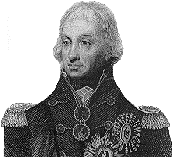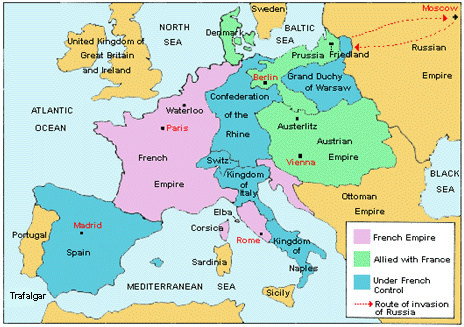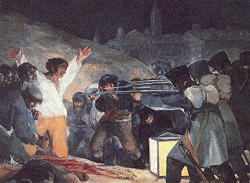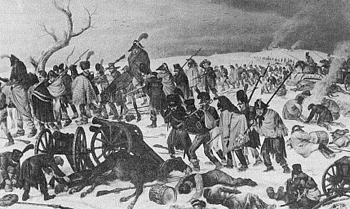The War of the Third Coalition (1805-1807)
As a conqueror, Napoleon achieved his greatest military successes in the years 1805 to 1807, defeating Austria, Prussia, and Russia. In 1805, France was at war against Great Britain. Austria and Russia, fearful of French power, joined the war against France, creating the Third Coalition. Prussia remained neutral at the outset of the war.
![]()
British Naval Victory at Trafalgar (1805)
In
1805, Napoleon prepared a fleet to invade Great Britain. However, on October
21, Lord Nelson's fleet found the combined French and Spanish fleets at
Cape Trafalgar, near Spain. British superiority in tactics and Nelson's
daring leadership eliminated French naval power for the balance of the
war, and Napoleon had to suspend his plans to invade Great Britain. Lord
Nelson lost his life and France lost its navy. The victory at Trafalgar
was undoubtedly the most glorious in the history of the British navy. Thereafter,
Napoleon had no hope of making war on the sea.

![]()
French Victories on Land:
Battle of Austerlitz (1805)
On land, however, Napoleon won many important victories. In 1805, he defeated a combined Austrian and Russian army at Austerlitz, north of Vienna. Austria signed a humiliating treaty, giving France control of most of Austria's possessions in Italy, including Venice.
Battle of Jena (1806)
In 1806,
Napoleon organized a number of German states into the Confederation of
the Rhine, which included almost every German state except Austria and
Prussia. Napoleon's actions in Germany brought Prussia into the
war against
France. However, Napoleon defeated the Prussians at Jena and two weeks
later, Napoleon was in Berlin.
Battle of Friedland (1807)
During
the Spring of 1807, Napoleon defeated the Russians at Friedland and went
on to occupy East Prussia. The Emperor then met with Tsar Alexander I of
Russia and King Frederick William III of Prussia. The rulers agreed to
end the War of the Third Coalition. Now, only Great Britain was at war
with France.

Napoleonic Empire in 1812
![]()
The Continental System
Napoleon defeated the major powers on the continent. However, he was unable to defeat the British militarily. Unable to invade the British Isles, Napoleon decided to establish the Continental System in an effort to destroy the British economy. He ordered all European nations to stop trading with Britain. All European ports were closed to British ships and goods. However, the Continental System proved to be impossible to enforce. Two "leaks" developed in Napoleon's Continental System. One was Portugal and Spain who refused to support the Continental System. The other leak was Russia who resumed trade with Britain after 1810.
![]()
The
Peninsular War
(1808-1814)
The Continental
System soon brought Napoleon back to the battlefield, for
he had to fight
a series of wars to enforce it. Spain and Portugal occupy
the Iberian
Peninsula in southwest Europe, and both nations refused to
support the
Continental System. Thereupon, Napoleon attempted to
close this serious
gap in the system by sending an army into Portugal and
Spain. He was
determined to bring Portugal and Spain into the
Continental
System. In 1808, Napoleon deposed the king of Spain
and put his
own brother Joseph on the Spanish throne. However, two factors
led to the failure
of this Peninsular War; the presence of British forces in
Portugal, and
the determined resistance of the Spanish people.
Indeed, the
Spanish rebelled against French rule and, by guerilla warfare,
created a serious
drain on France's military resources and served to
encourage Napoleon's
enemies elsewhere in Europe.

The Third of May, 1808
![]()
The Invasion of Russia (1812)
When Tsar Alexander resumed trade with the British, Napoleon decided to invade Russia to enforce the Continental System. He assembled an army of some 600,000 men, and in June 1812, he led this army into Russia. Napoleon planned to defeat the Russians in a quick, decisive battle. To his surprise, the Russian response was to retreat and avoid a decisive battle. In addition, the Russian used a scorched earth policy, burning their crops and homes as they went. Then, after a costly victory at Borodino, Napoleon was able to enter Moscow. However, he found the city deserted and on fire. The fire caused such extensive damage as to make it unfit for winter quarters. Thus, lacking shelter, food, and clothing to survive the oncoming winter, Napoleon began a long retreat.

Napoleon's Retreat From Russia
![]()
A Military Disaster in Russia
Napoleon's retreat became a route as his forces were harassed by Russian attacks and by the bitter cold of the Russian winter. Napoleon lost three-fourths of his Grand Army. It is estimated that only as many as 100,000 lived to tell the tale of their terrible ordeal.
![]()
The Fall of Napoleon
The disastrous invasion of Russia in 1812 marked the beginning of his fall. In 1813, the Russians, Prussians, and Austrians joined in the last and most powerful coalition against Napoleon. They defeated Napoleon at Leipzig, in central Germany, at the Battle of Nations. In 1814, Napoleon abdicated and was exiled to the island of Elba, located of the west coast of Italy. In March 1815, he escaped from Elba and returned to power for the period of the Hundred Days. Defeated at Waterloo in June 1815, Napoleon was again exiled, this time to the South Atlantic island of St. Helena where he died in 1821.